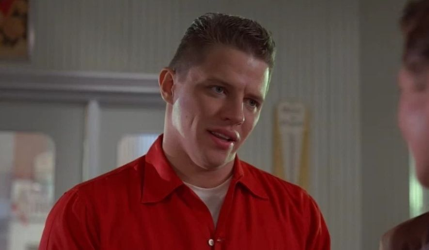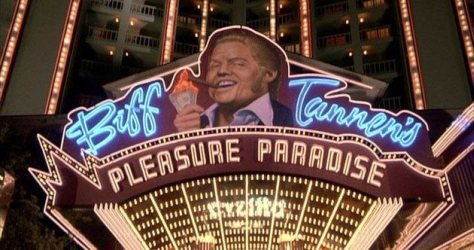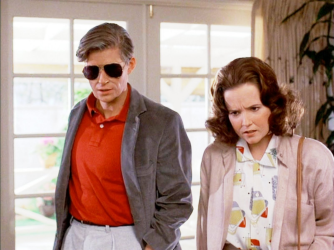You never know, you know? Movies that you loved at the time may, on a repeated viewing, turn out not to be as great as you remember them. Especially really hyped movies like, say, Back To The Future.
Fortunately, that’s not the case with Back To The Future. (Psych!)

Burn! Burned you like this cheesy composite shot didn’t come anywhere near burning Michael J. Fox and Christopher Lloyd.
Its not just comical, but laughable, portrayal of the ’50s has lapped around to become quaint, like those Judy Garland movies about the gilded age: A reflection of a sort of smug modernity that we’re far enough from to find charming. (OK, I wasn’t bugged by the representation of the ’50s at the time, though I realized how exaggerated it was, but my dad wasn’t amused. Though he did like the movie.) And its representation of the ’80s is also similarly aged, however sincere it was at the time. (Huey Lewis and the News was “too loud”?)
This was before we politicized everything, however, so we can look at this without having to analyze what they were trying to say about the patriarchy or white power (though, naturally, a big deal Must Be Made about the gag where Michael J. Fox invents rock-and-roll). And the upshot is: This movie is such a tight construction of action, suspense and comedy that it’s greatest sin may be that it’s just too darn slick.

As slick as Biff’s (Thomas F. Wilson) hair.
I mean, here we have a time travel plot: A device that would be utterly annihilated in the ’90s by “Star Trek: Voyager” and a bunch of other lazily constructed TV and movie crap to the extent where when you see a time-travel plot to day, you almost have to roll your eyes. At least I do, because it almost invariably mean that the writer(s) have an unlimited supply of deus ex machina and they’ll use it in a way that would make Homer blush. But here, as in some other ’80s movies (Terminator, e.g.), it’s done right. Not because it makes sense (how can a time travel plot ever really make sense?) but because it sets up the rules and it plays by them.
To wit: Marty has accidentally prevented his parents from getting together, and he must repair that or suffer the fate of non-existence, as shown by a photograph he has of his siblings where they start to fade out. Of course, this makes no sense, since they’d just vanish entirely, instantly, along with him as soon as he caused the problem—which, if he didn’t exist to cause it, how could he un-exist himself?—but there’s no fun in that. The point is, there’s a rule, and the movie expertly trades on the suspense generated by this rule, taking Marty’s fate down to the wire.
I wish modern filmmakers would grasp that: There have to be stakes, obstacles and limits on getting around them. But they’re too busy counting their billions of dollars, I guess.

Probably lighting their cigars with moneys. (From the sequel.)
Even though the basic outcome of the movie is assured from the get-go—there’s literally no chance that this film can have an unhappy ending—the film manages to play the suspense angle relentlessly and successfully. Marty’s mom falls in love with him, instead of his dad, and all of his attempts to redirect that go awry. We’re pretty sure that Marty’s not going to screw up his history, but the movie gives us a twist there. We’re pretty sure he’s going to “get back in time”, but the movie dares us to believe it as every thing goes wrong on the night when the lightning strikes the clock tower. Doc Brown’s fate. Biff’s fate. Marty’s dad’s fate.
This movie sells you on outcomes you know just can’t happen, and convincingly. There’s no padding in this film: If it’s not plot or character development, it’s comedy (and it’s probably comedy and plot or character development).
Anyway, Zemeckis (and constant co-writer Bob Gale) has never been better; it was as if Spielberg’s competence and childlike love of cinema was contagious. I could probably ask a bunch of people who have seen this movie to draw a map of Hill Valley and the Twin Pines Mall and get roughly the same map. It’s the command of space that predominates these films, that gives them a thrill you don’t get from CGI. Alan Silvestri does a serviceable John Williams impression for the score, which is still memorable (if not on the level of Jaws or Star Wars). The effects—actually pretty sparing!—hold up very well. Even the old age makeup works! (And that almost never happens!)

It works better than some of the stills would have you believe.
If there’s a weak part to the movie, it’s probably Michael J. Fox. Marty’s character is a two-dimensional ’80s high-school cliche—this is raised to ridiculous levels in the sequels—and there’s nothing terribly wrong with that for the purposes of this film. It just seemed to me that Fox’s mid-20s high-school senior was more annoying (and less endearing) than I recalled from my original viewing. Fox was at the height of his fame, of course, and there’s maybe a bit more crossover between his Alex P. Keaton and Marty McFly than makes sense. I don’t know.
The kids dug it. The Boy made pretty much the same observations regarding the command of space and suspense of the film, while The Flower commented on how impressed she was by the old age makeup. Perhaps amusingly, the only actor they know from the film is Crispin Glover—from his remake of Willard!
It’s always nice when a classic lives up to your memories of it.

I guess Crispin Glover didn’t show up at the reunion.

One thought on “Back to the Future (1985)”